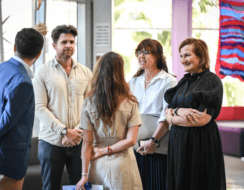12 May 2020
NewsVictoria – respite and emergency foster carer
After just under two years of being a foster carer, Victoria has developed a passion for providing children with the security, support and connection they need to flourish and grow, showing that fostering can be right for anyone who is ready to make a meaningful commitment in a child’s life.
Victoria immigrated to Australia with her family in 1984 to escape the Lebanese civil war. Growing up in Northern Sydney, she embraced Australian culture, adopting the typical Aussie dinner ‘meat and three veg’, while maintaining a positive connection to her Lebanese background.
She went on to study engineering at university and launched herself into a career that would dominate her life for the next 20 years. Feeling like she had achieved success in her career, she decided to reassess the direction she would take in the next stage of her life.
“I think I got side tracked by work and looking after family members. Then when the dust settled at the age of 40, I realised what I always wanted to do, so I took up fostering,” says Victoria.
During her research into foster care, Victoria discovered SSI’s Multicultural Foster Care program. The program emphasises maintaining the bonds of ethnic background, religion and language when forging foster care placements for children from diverse backgrounds. As a Lebanese woman and Arabic speaker, SSI’s approach appealed to Victoria.
“It’s important to maintain a child’s connection to culture so they can maintain a sense of identity. It’s important that they know where they come from,” she says.
After undergoing the application process, Victoria received her first placement in October 2018. As she continued to work a Monday to Friday job, she chose to do respite and emergency care, looking after children on weekends and during work breaks.
Victoria knows that without a partner or her own children, she would have the time and emotional energy to give her placements the care, attention and structure they need to thrive. Some foster children have never had routine in their lives.
“In my household it is always about routine, discipline, and structure. It’s about early bed times, developing good healthy eating habits, exercising by going to the park, free time, blaring the music, and lots of playing. It works well with the kids,” she says.
She also has two cats, Autumn and Blackberry, who have taken a liking to the children Victoria fosters, stepping into the role of therapy cats.
“The kids love them. They can be rough, and push and pull them, but they just put up with it!” she laughs.
Therapy cats aside, Victoria explained her ultimate goal is to provide the children and teens she supports with security.
“I’m trying to give them security in many different ways; financial, by supporting them to study and get a job; emotional, by helping them be strong enough to say no to situations that are not good for them. Through health, I’m teaching them about eating, exercise and meditation. And I try to give them confidence that they can do something if they put their mind to it.”
While temporarily taking responsibility for the welfare and development of another person’s child may sound like a daunting task, Victoria says she believes foster caring is as easy or difficult as you make it. Victoria explains that what a carer really needs is dedication.
‘To be a carer you have to be dedicated to the children. You need to integrate your life into theirs,’ she says.
When asked what advice she has for anyone considering becoming a foster carer Victoria has a clear message: “Do it yesterday, before tomorrow. It’s very rewarding and very worthwhile.”
Are you considering becoming a foster carer? Visit SSI’s Multicultural Foster Care FAQs or take our quiz to see if you are eligible.


